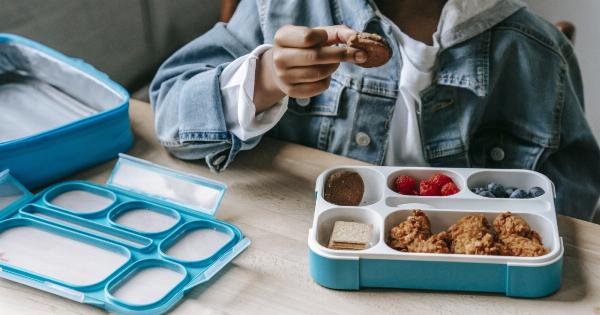When your child is recovering from an illness or surgery, it’s essential to provide them with proper nutrition to support their healing process.
A nutritious diet can help boost their immune system, promote tissue repair, and maintain their overall health. However, it can be challenging to know what to feed your child during this time, especially if they have specific dietary restrictions or loss of appetite due to their condition.
In this article, we will explore some tips and guidance on feeding your child while they recover.
Consult with a healthcare professional
Before making any dietary changes for your recovering child, it’s crucial to consult with their healthcare professional. They will provide you with specific guidelines tailored to your child’s condition, ensuring their dietary needs are met.
Depending on the illness or surgery, your child may require a modified diet, such as a soft or pureed food diet, to prevent any complications.
Focus on nutrient-dense foods
While your child is recuperating, it’s essential to provide them with nutrient-dense foods that can aid in their recovery. Try to include a variety of foods from each food group to ensure they receive a balanced intake of essential nutrients.
Some nutrient-dense foods to consider include:.
- Lean protein sources such as chicken, fish, eggs, and tofu
- Fruits and vegetables rich in vitamins, minerals, and antioxidants
- Whole grains like brown rice, quinoa, and whole wheat bread
- Dairy products or alternatives for calcium and vitamin D
- Healthy fats from sources like avocado, nuts, and olive oil
Ensure hydration
Proper hydration is vital for your child’s recovery. Encourage them to drink plenty of fluids throughout the day, including water, herbal teas, and fruit juices. Avoid sugary drinks as they can hinder the healing process.
If your child has difficulty drinking enough fluids, you can offer them foods with high water content, such as soups, fruits, and vegetables.
Snack smart
Children often have smaller appetites while they are recovering. To ensure they still get enough nourishment, offer them frequent small meals and snacks throughout the day.
Opt for nutrient-dense snacks like yogurt, nuts, seeds, whole grain crackers, and fresh fruits. Avoid sugary snacks and processed foods as they provide little nutritional value.
Consider dietary restrictions
If your child has specific dietary restrictions due to their condition or medication, it’s crucial to follow them strictly.
For example, some medications may require your child to avoid certain foods or beverages to prevent interactions or side effects. Consult with your child’s healthcare professional or a registered dietitian to create a suitable meal plan that adheres to their dietary restrictions while providing adequate nutrition.
Get creative with food preparation
While your child may not have a strong appetite while they recover, you can make their meals more appealing by getting creative with food preparation. Try incorporating different textures, flavors, and colors to make meals more enticing.
Use cookie cutters to shape fruits and vegetables into fun shapes or create colorful smoothie bowls with various toppings. Additionally, involving your child in meal planning and preparation can help increase their interest in food.
Offer comfort foods
During the recovery period, your child may crave comfort foods that bring them joy and familiarity. While it’s essential to prioritize nutrient-dense options, it’s also okay to occasionally indulge their cravings.
Modify their favorite comfort foods to make them healthier, such as baking homemade chicken nuggets instead of opting for processed ones or making sweet potato fries instead of regular fries.
Monitor and address changes in appetite
If your child experiences a loss of appetite or significant changes in their eating habits while they recover, it’s crucial to address it promptly.
Loss of appetite can be a common side effect of various illnesses or surgeries, but it’s essential to ensure your child still receives proper nutrition. Consider smaller, more frequent meals, nutrient-rich drinks, or even consulting a registered dietitian for further guidance.
Encourage a calm and pleasant eating environment
Creating a calm and pleasant eating environment can help your child feel more relaxed and inclined to eat. Eliminate distractions, such as excessive noise or screen time, during meals.
Sit together as a family and engage in light conversation or play soft background music. Additionally, praising your child’s efforts to eat and expressing your support can positively impact their appetite.
Gradually reintroduce regular diet
As your child’s recovery progresses and their healthcare professional gives the green light, you can gradually reintroduce their regular diet. Start by reintroducing one food group at a time and monitor their tolerance.
If any discomfort or adverse reactions occur, consult their healthcare professional immediately. Slowly transitioning back to their regular diet will help ensure their bodies adjust seamlessly.
Conclusion
Feeding your child while they recover requires careful consideration of their dietary needs, restrictions, and preferences. Focus on providing nutrient-dense foods, ensuring hydration, and offering frequent small meals and snacks.
Consult with a healthcare professional to address any specific dietary requirements or concerns. Remember to create a calm and pleasant eating environment and gradually reintroduce their regular diet as their recovery progresses.
By prioritizing your child’s nutrition during their recovery, you can help support their healing process and overall well-being.




















